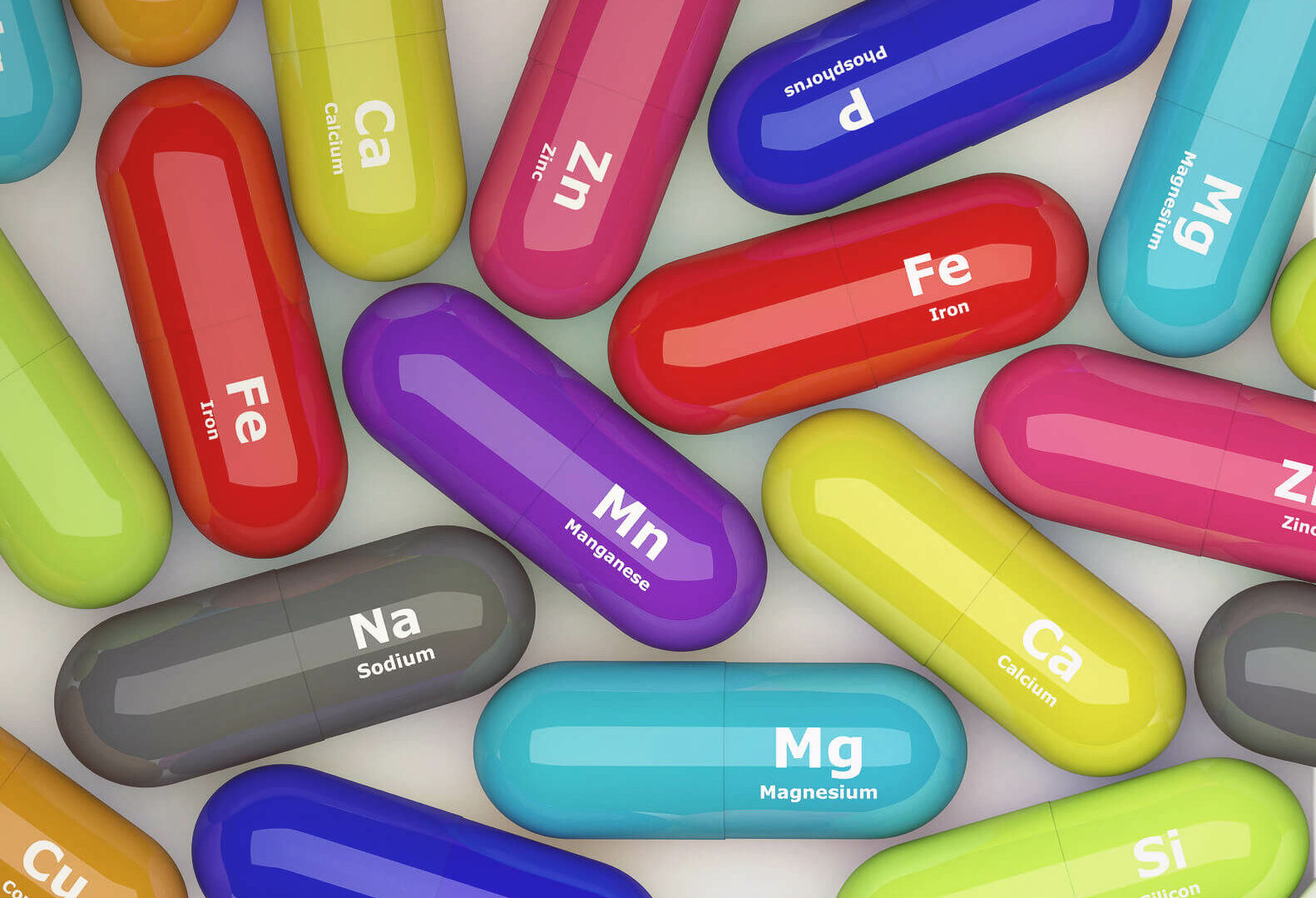In the fitness industry, we often place all our dietary focus on consuming protein or the other 2 macronutrients (carbs and fat) and neglect other important aspects such as micronutrients, vitamins and minerals.
While it is still important to track total macronutrient consumption and distribution, in order to improve your overall health and physique, you may be surprised to learn the integrative role and health benefits that vitamins and minerals also provide.
Within this article we will dive into 5 key minerals you may be in need of to optimize your diet and health. As you will see, these minerals may actually have a key role in how to digest food, store fat, perform in the gym and fight disease. Let’s go…
Minerals & Recommended Intake
Minerals are classed as micronutrients which have a variety of metabolic functions within the human body including muscle contraction, heart rhythm, nerve pulse conduction, oxygen transport, enzyme activation, immune function, anti-oxidant activity and even bone health [1].
Minerals can be broken down into two categories, macro minerals and trace elements. Currently the Recommended Dietary Allowances (RDA) recognizes 3 macro minerals and 9 trace elements that should be consumed on a daily basis [1].
While the recommended doses provide the minimal amount to avoid deficiencies and support the body’s daily functions, it is also important to note the difference between avoiding a deficiency and optimizing levels. Most of the readers here will want to optimize their diet and therefore micronutrient intake, so should be aware that intense exercise often further increases our body’s requirements. As you can see, the general recommended dose can often be too low for an athlete trying to optimize every aspect of diet, health and performance.
Here’s an overview of 5 key minerals that may have the most relevance to an athlete.
1.) Calcium
Most of us know that calcium is essential for developing healthy bones and teeth. But, they are just a few key benefits; in fact, calcium also assists in blood clotting, muscle contraction and nerve transmission [2].
Interestingly, exercise may increase calcium loss, further emphasizing its importance if you workout. One study found that after 10-weeks of high intensity endurance training, serum calcium levels were significantly decreased [4].
Female athletes in particular have been shown to demonstrate low calcium levels due to a combination of factors including high intensity exercise, low calorie intake and avoidance of dairy or calcium rich foods [5].
Apart from daily issues and contraindications from having low calcium stores, longer-term research suggests that inadequate calcium intake may increase your risk of osteoporosis [3]. The RDA for calcium is 1000mg; however, specific populations such as female athletes may require an even higher dose.
Example Foods Rich in Calcium
- Milk
- Yogurt
- Cottage Cheese
- Ice cream
- Kale
- Cabbage
- Broccoli
- Oranges
- Celery
- Sesame seeds
2.) Magnesium
Magnesium is another key mineral being involved in over 300 enzymatic reactions!
Magnesium’s functions in the body are very diverse, ranging from regulating muscle contractions, oxygen delivery and even initiating protein synthesis [1].
Magnesium may also play a role in insulin sensitivity. It has been previously shown that low magnesium levels may decrease your body’s ability to mediate blood sugar uptake into the cells [6].
More recently, a group of researchers discovered that magnesium supplementation may actually improve insulin sensitivity. Non-diabetics, who currently had low magnesium levels, were provided with 2.5g of magnesium a day for 3 months.
The results demonstrated that magnesium supplementation improved the beta cells function and increased insulin sensitivity [7]. As you may know, insulin sensitivity will allow your body to utilize glucose more efficiently and improve overall health parameters.
Aside from insulin sensitivity, magnesium supplementation may also aid in sleep quality and help you relax, which makes it a popular nighttime supplement.
One group of researchers noted the chemical make-up of magnesium including the calming agonist GABA which helps create that relaxed state and therefore, improved sleep quality.
These researchers took 46 elderly subjects and randomly put them in a magnesium group (supplementing with 500mg) or placebo group and monitored their sleep habits for 8 weeks. At the conclusion of the study the magnesium group demonstrated significant increases in sleep time and sleep efficiency [8].
The RDA for magnesium is 400mg per day, which you can take at night as a standalone supplement or as part of a ZMA blend, another key mineral discussed below.
Example Foods Rich in Magnesium
- Wheat
- Rice
- Cocoa powder
- Almonds
- Hazelnuts
- Cashews
- Spinach
- Avocado
- Oatmeal
3.) Iron
Iron is a mineral that is involved in red blood cell formation and function. Iron also plays a role in oxygen transport and utilization of energy, making it crucial for athletes and those wanting to optimize sports performance [1].
Interestingly, out of all the minerals, a deficiency in iron is one of the most common in the United States. Deficiency is especially high in athletes, females and vegetarians/vegans. Iron deficiency may occur for several reasons; however, it can often be related to inadequate nutrition, excess high intensity exercise or large amounts of bleeding [9].
If you are within a high risk group, such as those listed above, it is important to track your iron content via blood analysis. Iron deficiency can lead to reduced performance, fatigue and dizziness as well as other serious health issues such as anemia [10].
In contrast, it is also important to note that you should not just randomly take high dose iron supplements unless you are prescribed by a doctor or know you have low levels. Too much iron could also result in serious health effects and is of just as much concern as low iron levels – in some ways it’s a double-edged sword, so supplementation should only be taken when actually needed.
For most, iron levels can also be improved through nutritional interventions by adding in several food groups high in iron. In severe cases such as in vegetarians, females and those with anemia, food alone is unlikely to raise one’s levels meaning supplementation is needed. The RDA for iron is 8mg; however those supplementing for low iron or anemia may take up to 50mg per day.
Example Foods Rich in Iron
- Liver
- Beef
- Pork
- Veal
- Poultry
- Clams
- Oysters
- Cashews
- Almonds
- Green beans
4.) Zinc
Zinc is a very diverse mineral involved in a variety of functions throughout the body including digestion, metabolism, reproduction and even wound healing [1].
Zinc deficiencies may result in loss of body weight, fatigue and decreased muscular endurance [11]. Therefore, it is essential to consume enough zinc throughout your diet especially if you’re an athlete.
If you are deficient in zinc, supplementation may provide you with some benefit. However, it is important to note that research on zinc supplementation is very limited and the evidence is still mixed in terms of zinc and performance enhancement [12]
For the most part, you can get adequate zinc through the diet. If you are looking to optimize levels, around 30-50mg of zinc per day is recommended. If you are also taking magnesium, you can obtain both by taking a ZMA mix before bed.
Example foods High in Zinc
- Oysters
- Beef
- Veal
- Lamb
- Pork
- Chicken
- Lima beans
- Black eyed peas
- White beans
- Yogurt
5.) Potassium
Potassium is another less well known but nonetheless essential mineral that has a variety of functions within the human body. Potassium helps maintain proper fluid balance and assists in heart and muscle function.
Potassium is probably best known as a protective mineral with research showing it can reduce the risk of strokes as well as osteoporosis.
Recently, a meta-analysis investigated the effects of potassium and its proposed protective effect on stroke and brain health. These researchers found that by increasing potassium intake to around 4000mg a day, stroke risk was decreased by 24%! [13].
Potassium has also been shown to have a protective effect on bone health because it reduces calcium retention and thus may prevent excess bone breakdown [14].
Unlike other minerals such as iron, potassium is still relatively safe in higher doses. The current RDA is 4,7000mg per day; however, several food groups such as fruits and vegetables are also extremely high in potassium so supplementation is often only required for people with a specific medical condition.
Example Foods High in Potassium
- Banana
- Avocado
- Spinach
- Sweet potato
- Coconut water
- Yogurt
- White Beans
- Acorn Squash
- Chocolate
- Strawberries
Summary
There you have 5 of the key minerals you may consider supplementing with, or, if you already take them, a breakdown of what they actually do and why they may be beneficial.
As you can see, minerals have a lot of important functions in the body and deficiencies can cause either reduced performance or may, in some cases, result in serious health effects.
If you feel some of the minerals here could improve your health and take your physique a stage further, then the most sensible first step is to have a basic blood draw to assess current levels. If you struggle with fatigue, low energy or other issues, some of these minerals may just be the missing link in your regime…
References
- Williams, M. H. Dietary Supplements and Sports Performance: Minerals.
- Haff, G. G., & Triplett, N. T. (Eds.). (2015). Essentials of Strength Training and Conditioning 4th Edition. Human kinetics.
- Gremion, G., Rizzoli, R. E. N. É., Slosman, D. A. N. I. E. L., Theintz, G. É. R. A. L. D., & Bonjour, J. P. (2001). Oligo-amenorrheic long-distance runners may lose more bone in spine than in femur. Medicine and science in sports and exercise, 33(1), 15-21.
- Dressendorfer, R. H., Petersen, S. R., Lovshin, S. E. M., & Keen, C. L. (2002). Mineral metabolism in male cyclists during high-intensity endurance training. International journal of sport nutrition and exercise metabolism, 12(1), 63-72.
- Moffatt, R. J. (1984). Dietary status of elite female high school gymnasts: inadequacy of vitamin and mineral intake. Journal of the American Dietetic Association, 84(11), 1361-1363.
- Rumawas, M. E., McKeown, N. M., Rogers, G., Meigs, J. B., Wilson, P. W., & Jacques, P. F. (2006). Magnesium intake is related to improved insulin homeostasis in the framingham offspring cohort. Journal of the American College of Nutrition, 25(6), 486-492.
- Guerrero‐Romero, F., & Rodríguez‐Morán, M. (2011). Magnesium improves the beta‐cell function to compensate variation of insulin sensitivity: double‐blind, randomized clinical trial. European journal of clinical investigation, 41(4), 405-410.
- Abbasi, B., Kimiagar, M., Sadeghniiat, K., Shirazi, M. M., Hedayati, M., & Rashidkhani, B. (2012). The effect of magnesium supplementation on primary insomnia in elderly: a double blind placebo-controlled clinical trial. Journal of Research in Medical Sciences, 17(12).
- Beard, J., & Tobin, B. (2000). Iron status and exercise. The American journal of clinical nutrition, 72(2), 594s-597s.
- Haas, J. D., & Brownlie, T. (2001). Iron deficiency and reduced work capacity: a critical review of the research to determine a causal relationship. The Journal of nutrition, 131(2), 676S-690S.
- Micheletti, A., Rossi, R., & Rufini, S. (2001). Zinc status in athletes. Sports medicine, 31(8), 577-582.
- Lukaski, H. C. (2001). Magnesium, zinc, and chromium nutrition and athletic performance. Canadian Journal of Applied Physiology, 26(S1), S13-S22.
- D’Elia, L., Barba, G., Cappuccio, F. P., & Strazzullo, P. (2011). Potassium intake, stroke, and cardiovascular disease: a meta-analysis of prospective studies. Journal of the American College of Cardiology, 57(10), 1210-1219.
- Lemann, J., Pleuss, J. A., Gray, R. W., & Hoffmann, R. G. (1991). Potassium administration increases and potassium deprivation reduces urinary calcium excretion in healthy adults. Kidney international, 39(5), 973-983.

